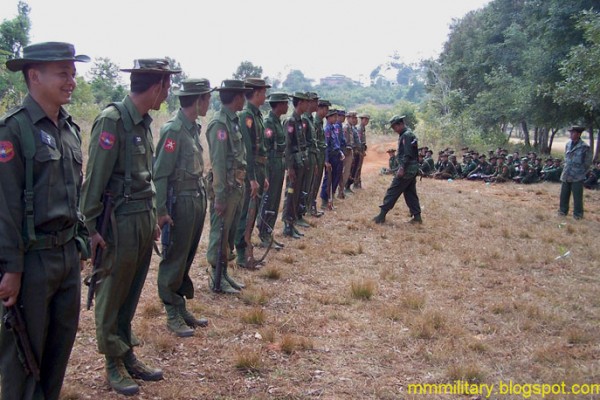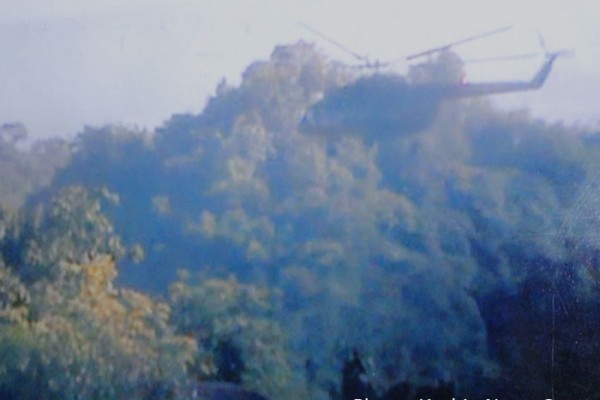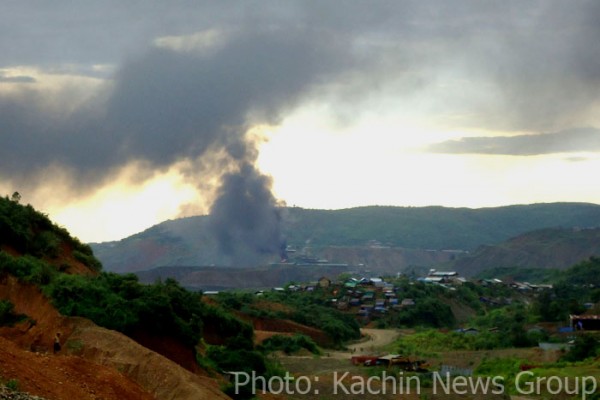Officials with the Kachin Independence Army (KIA) claim that at as many as 140 soldiers from the Burmese military died on August 29 following a massive explosion at a mining compound that army forces were using as a temporary base in Kachin's state Hpakant (also Hpakan, Phakant) jade mining district.
 The massive explosion that ripped through the compound belonging to the Wai Aung Kaba company near the Myauk Phyu jade mine reportedly caused what has been described as the single highest one day death toll for the government side during its 15-month Kachin offensive so far. According to KIA sources the lethal blast was triggered by an initial smaller explosion planted by members of the Kachin resistance. When the first blast went off it caused the large stockpile of explosives used for mining which were stored at the site to explode shortly afterward, causing what was described as a huge explosion.
The massive explosion that ripped through the compound belonging to the Wai Aung Kaba company near the Myauk Phyu jade mine reportedly caused what has been described as the single highest one day death toll for the government side during its 15-month Kachin offensive so far. According to KIA sources the lethal blast was triggered by an initial smaller explosion planted by members of the Kachin resistance. When the first blast went off it caused the large stockpile of explosives used for mining which were stored at the site to explode shortly afterward, causing what was described as a huge explosion.
At least one soldier from the Kachin resistance reportedly died during the attack, it is unclear whether he was killed by the first blast or the second. The solider is said to be from a unit belonging to the local civilian militia controlled by the Kachin Independence Organization (KIO) called the Mungshawa Hpyen Hpung or People's Army.
 KIO fighters say in the days leading up to the explosion more than 100 Burmese soldiers were able to get inside the compound by posing as employees of the mining firm. The KIA observed dozens of individuals dressed as miners entering the mine compound and then leaving again in military uniforms as they headed to fight in the front-lines, according to KIA sources.
KIO fighters say in the days leading up to the explosion more than 100 Burmese soldiers were able to get inside the compound by posing as employees of the mining firm. The KIA observed dozens of individuals dressed as miners entering the mine compound and then leaving again in military uniforms as they headed to fight in the front-lines, according to KIA sources.
On September 1 a special ceremony was held in Ginsi-Seng Ra, the headquarters of the KIA Battalion 6 to mark the attack on the mining compound. At the event Battalion 6 Captain Maji Naw Rin praised the actions of the soldier who carried out the attack. An assortment of guns and ammunition that was confiscated from the site, were also displayed to support the KIA's claim that the mine compound was acting as a military base.
 According to a KIA officer based in Hpakant over the last two weeks of August the Burma army lost an additional 60 other troops during fighting with the KIA in the Hpakant region. These lethal clashes took place at Seng Tawng, Gwi Hka, Nam Maw, Myauk Phyu and Maw Mau Bum.
According to a KIA officer based in Hpakant over the last two weeks of August the Burma army lost an additional 60 other troops during fighting with the KIA in the Hpakant region. These lethal clashes took place at Seng Tawng, Gwi Hka, Nam Maw, Myauk Phyu and Maw Mau Bum.
In an effort to stop the Burma army from sending reinforcements to the Hpakant area as of August 31st Kachin resistance forces are said to have has completely shut down most points of entry into the region. Much of the area's migrant mining worker population has already fled as have many local Kachin people, a villager told the Kachin News Group.
Military helicopters send reinforcements to Hpakant
On August 31 five Burmese military helicopters transported at least 100 soldiers and weapons to the Hpakant area, according to a KIA official based in the area.
The commander of Light Infantry Division No. 33 recently arrived in the Hpakant area to personally direct the military's operations against the KIA, according to a source connected to a Burmese military units operating in Hpakant.
No major fighting has taken place in and around Hpakant since the attack on the Wai Aung Kaba company compound, a local resident told the Kachin News Group.
Humanitarian crisis worsens among displaced from Hpakant
Fighting in Hpakant at the end of August caused more than 6,000 people to flee from their homes in the area, say local relief volunteers. The growing displaced population from Hpakant has yet to receive any humanitarian aid from government officials or outside groups, according to Kachin church officials in Hpakant.
Many of the area's displaced people are sheltering in local Kachin churches, Buddhist monasteries and relative's homes in the Hpakant town center. Most of the food and medical relief supplies have come from local religious organizations and jade businessmen, according to volunteers who are operating in the area. A local Kachin Baptist pastor told the Kachin News Group that displaced families need tents, food and medical assistance. Water borne illnesses like diarrhea remain a problem among the displaced population, he said.



